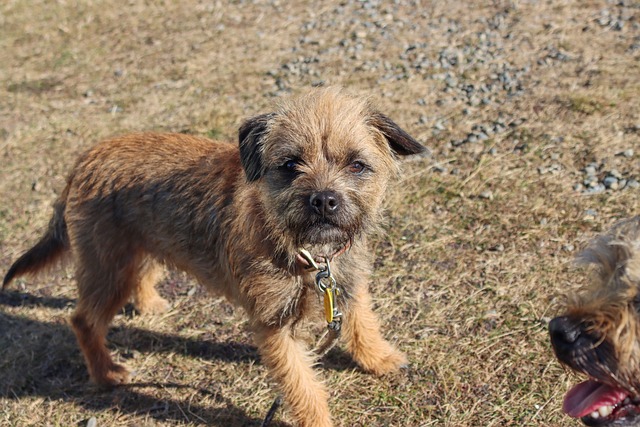


The Border Terrier is a small, energetic, and affectionate dog breed originally bred for hunting. Known for its cute, wiry coat and expressive face, this breed is lively, friendly, and well-suited for families, especially those with children or other pets. Border Terriers are highly intelligent and social dogs, known for their playful nature and loyalty to their owners. Despite their small size, they have a lot of energy and can be very active, making them excellent companions for active households.
The Border Terrier originates from the border regions of England and Scotland, where it was used as a working terrier to hunt foxes and other small prey. The breed was developed in the 18th century by local farmers and hunters to chase foxes from their dens during hunts. Border Terriers were particularly valued for their ability to work in tight spaces and for their determination and stamina. They were often kept in packs and were skilled at working alongside other hunting dogs. Over time, the breed became popular not only as a hunting dog but also as a companion animal. Border Terriers were officially recognized by the Kennel Club in the early 20th century and continue to be beloved pets worldwide.
The Border Terrier is a small, compact dog with a wiry, rough coat that comes in a variety of colors, including red, blue and tan, grizzle and tan, and more. They typically stand between 10 and 11 inches tall at the shoulder and weigh between 11 and 16 pounds. The breed has a distinctive face with a "otter-like" shape, with expressive dark eyes, a beard, and bushy eyebrows that give them an endearing appearance. Their ears are small and fold forward, and they have a short, straight back with a tail that is often carried high. The Border Terrier’s coat requires regular grooming to maintain its texture and appearance, and their small size makes them easy to care for in terms of physical maintenance.
Border Terriers are friendly, affectionate, and energetic dogs that make excellent companions for families. They are known for being good with children and often get along well with other pets, including dogs and cats, especially if they are raised together. Border Terriers are generally social and thrive on human companionship, often seeking attention and affection from their owners. Despite their small size, they are confident and alert, with a strong prey drive, which means they may be inclined to chase small animals if not properly trained. They are intelligent and independent, which can sometimes make them a little stubborn during training, but they are usually eager to please and can be highly responsive to positive reinforcement techniques.
Border Terriers are active dogs with moderate exercise needs. They enjoy daily walks, playtime, and outdoor activities that allow them to explore their surroundings. Though small, they have a lot of energy and enjoy engaging in physical activities. Regular walks and interactive play, such as fetch, are essential for keeping them fit and mentally stimulated. Border Terriers are also well-suited for off-leash activities in secure areas, as their strong instincts to hunt may kick in when they pick up a scent. While they don't require extensive exercise compared to larger breeds, they do need consistent mental stimulation, so puzzle toys and training sessions are beneficial for their well-being.
Border Terriers are intelligent and trainable but can sometimes be independent and stubborn. Early training and socialization are important to help them develop into well-mannered, confident dogs. They tend to respond well to positive reinforcement, such as treats, praise, and play. Border Terriers can be a little independent and may not always come when called, especially if they are distracted by a scent. Socialization with other dogs, people, and different environments is crucial, as it helps them grow up to be well-adjusted and friendly. Given their terrier nature, Border Terriers may also have a tendency to dig or chase small animals, so consistent training and boundary-setting are essential to prevent undesirable behaviors.
Border Terriers are generally healthy dogs with a lifespan of 12 to 15 years. Like many breeds, they can be prone to certain health issues, including hip dysplasia, patellar luxation (knee problems), and certain eye conditions such as cataracts. Regular veterinary check-ups and maintaining a healthy diet are important for ensuring the long-term health of the breed. Their wiry coat requires regular grooming, typically once or twice a week, to prevent matting and to keep it in good condition. Border Terriers shed minimally, but they still benefit from routine brushing to remove loose hairs. Regular ear cleaning and dental care are also important for maintaining their overall health.
The average lifespan of a Border Terrier is between 12 and 15 years, which is typical for small dog breeds. Their lifespan can be influenced by factors such as genetics, diet, exercise, and overall health. With proper care, a balanced diet, and regular exercise, Border Terriers can live long and happy lives. Regular veterinary visits, early detection of health issues, and keeping them at a healthy weight are key to ensuring they remain healthy throughout their lifespan.
© copyright Dog Compendium 2024 - 2026